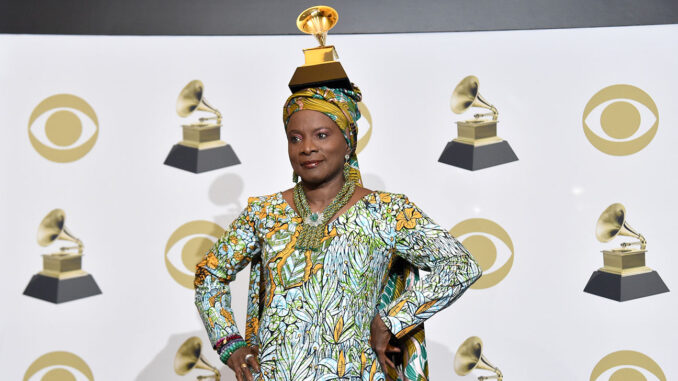
The Recording Academy has added three new categories to the Grammy Awards, including best African music performance, best pop dance recording and best alternative jazz album.
The changes were voted on and passed at the academy’s Board of Trustees meeting last month. The 66th Grammys, which now has 94 categories, will air live in early 2024.
The addition of the best African music performance category reflects how African acts such as Burna Boy, Wizkid and Tems — along with the rise of the Afrobeats genre — have become global chart-topping stars and streaming juggernauts. The new category “recognizes recordings that utilize unique local expressions from across the African continent,” including subgenres like Afrobeats, Afro-fusion, Afro pop, Bongo Flava, Ethio jazz, Kizomba, High Life, Fuji, Ndombolo, Mapouka, Ghanaian drill, Afro-house and South African hip-hop.
African-based songs previously dominated in nominations in the best global music performance category, which launched in 2022. The new award honoring African music could give global songs from other genres, such as Latin music, K-pop and Arabic music, a better chance at earning nominations for best global music performance.
The announcement of the best pop dance recording will give pop stars who release dance-flavored music a chance to earn nominations without competing with acts who are deeply rooted in dance music.
Over the years, artists with dance songs competed for best dance/electronic recording, and the winners have ranged from superstars like Beyoncé, Janet Jackson, Britney Spears and Justin Timberlake to Skrillex, The Chemical Brothers and Rüfüs Du Sol.
The new category will also give pop stars who don’t cross over to other genres like R&B, rap, rock or country a chance at earning more nominations at the awards show. Pop acts are typically restricted to categories like best pop vocal album, best pop solo performance, best pop duo/group performance and the big four, including album, song and record of the year — if they get enough votes to compete in the top awards. It’s why artists like Beyoncé, Lizzo and Kendrick Lamar are usually the most-nominated at the Grammys — because they can compete for multiple genres — in comparison to performers like Adele, Harry Styles and Dua Lipa.
Best pop dance recording will honor songs that “feature up-tempo, danceable music that follows a pop arrangement” and have “strong rhythmic beats, significant electronic-based instruments with an emphasis on the vocal performance, melody and hooks.”
The new best alternative jazz album award will recognize “the genre-blending, envelope-pushing hybrid that mixes jazz with other genres, including R&B, hip-hop, classical, contemporary improvisation, experimental, pop, rap, electronic/dance music and/or spoken word.”
Other changes to the Grammys include moving two categories — producer of the year (non-classical) and songwriter of the year (non-classical) — to the general field, which includes album, song and record of the year, along with best new artist.
Grammys voters are limited in the categories they can vote, but all voters are allowed to vote in the general field, which means everyone will now be able to vote for producer of the year (non-classical) and songwriter of the year (non-classical).
“These changes reflect our commitment to actively listen and respond to the feedback from our music community, accurately represent a diverse range of relevant musical genres, and stay aligned with the ever-evolving musical landscape,” Harvey Mason jr., CEO of the academy, said in a statement. “By introducing these three new categories, we are able to acknowledge and appreciate a broader array of artists – and relocating the Producer Of the Year and Songwriter Of The Year categories to the General Field ensures that all our voters can participate in recognizing excellence in these fields. We are excited to honor and celebrate the creators and recordings in these categories, while also exposing a wider range of music to fans worldwide.”
The academy meets annually to review proposals for new awards and vote on changes for current awards. Songs and albums released between Oct. 1, 2022 – Sept. 15, 2023, will be eligible for nominations at the 2024 show. The nominees will be announced in November.

Be the first to comment